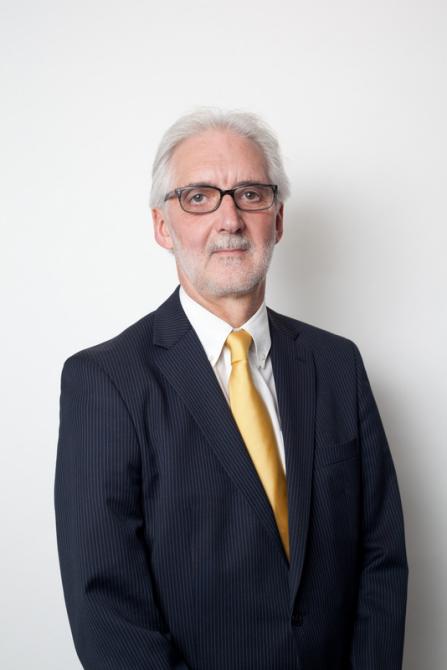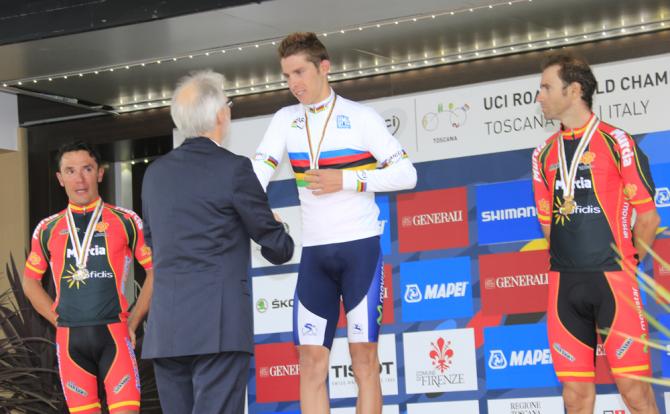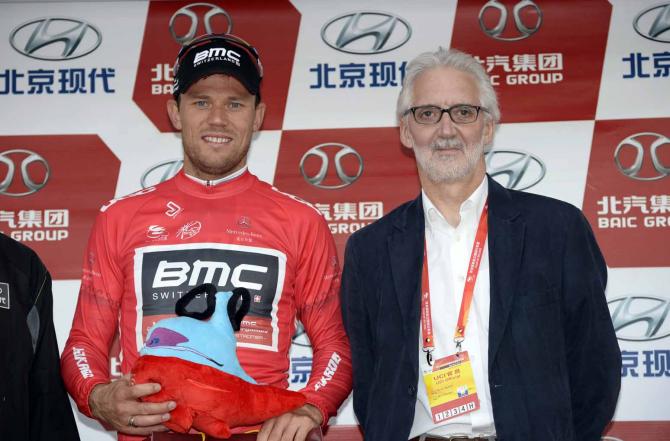Cookson: People are already approaching the Commission
Q&A with UCI president Brian Cookson



The terms of reference have been agreed and WADA are on board with the UCI’s initiative to launch a full and independent Cycling Independent Reform Commission. In an exclusive interview with Cyclingnews, UCI President Brian Cookson details the Commission’s remit, his belief that this is cycling’s best opportunity to address the matter of doping, and build a more successful and creditable sport.
Cyclingnews: There has already been a lot of commentary on the CIRC and how it will operate. Can you please start by outlining their remit in a nutshell?
Cookson: Its main focus is to look at the problems and the processes that allowed for the culture of cycling to perpetuate over a very long time, particularity from 1998 to 2013, and investigate the allegations about the UCI’s mishandling or collusion in any of that time period. As well as trying to look forward and to make some recommendations that will help us as a sport from not going down those problem roads again.
Cyclingnews: Why does this matter so much for the sport of cycling?
Cookson: I’ve read comments on the internet, but one thing I wanted to say is that the doors are now open for the Commission. They’ll take notice of all the views out there and I welcome that, I welcome open debate but I think it’s important that we don’t give people excuses for staying silence just because they feel that the Commission should be constituted in a different way or it has a minor flaw. Of course it’s not a perfect solution but it’s one that will work if the cycling world allows it to work. This is our chance to get this right and make a big change in how we run the sport. It’s a chance to draw a line and move forward in a positive way. This is our chance to make the sport right. This is our chance, so please, let’s take it.
Cyclingnews: In terms of the reference point why have you chosen to focus on 1998 onwards, why not go back to the 70s, 80s or earlier when we still had doping, we still had blood doping in sport?
Cookson: Of course doping in cycling, as with all other sports didn’t start in 1998 but, in our view, that’s a convenient back stop but there’s no backstop in the overall sense. If the commission wants to they can take evidence from any historical period. They can go back as far as they like. I think some have focused and believe that evidence before ‘98 is inadmissible, but of course it’s not. The commission can go back as far as they like, but they really need to focus on this period when things really got out of control and elevated to a new level of sophistication. Everyone can agree that the Festina Affair was a midpoint but clearly after that it became more scientific and more deeply entrenched. That’s the key point. What changed at that point was that the arms race was accelerated and things became more dangerous and damaging. That’s not to say that before that point people weren’t doping. You have to start somewhere and there’s a big enough task as it is with what happened after '98 but to understand that period do you need to have an understanding over what happened before, as well.
Get The Leadout Newsletter
The latest race content, interviews, features, reviews and expert buying guides, direct to your inbox!
Cyclingnews: How are you going to get people to come forward, because looking at the mandate it doesn’t seem to be a way for the Commission to compel individuals to provide testimony or evidence? We’ve seen Marty come out with an email address but surely there’s a risk whereby no one comes forward.
Cookson: I’m amused that some commentators have focused on the fact that there’s now an email address. What would have been a more appropriate starting point? It’s not going to be the only method by which people will be contacted, but it’s a simple way for us to open doors at the earliest opportunity for anyone that wants to come forward. The commission has been under pressure to get itself going, it is going, and it already has begun speaking to people, visiting places to look at evidence and it’s open for business. That email address isn’t the only way for contact with witnesses.
Cyclingnews: Has anyone emailed so far?
Cookson: I’m not aware of the day to day running of the commission but I can tell you that already a number of people have come forward and indicated that they want to give evidence, and I understand that appointments are being made.
Cyclingnews: Will you be aware of who is on that list?
Cookson: No I won't and won't be involved in the detailed activities within the commission now. As I’ve said all along, it’s important that it’s independent and that we let it get on with its job. Neither I nor anyone else from the UCI will interfere with its business.
Cyclingnews: So what information will they tell you? Because you’ve said that people have come forward to talk but you don’t know who many and who they are? So what information will the commission be passing on?
Cookson: We’ll get an occasional update on roughly a monthly basis, possibly on how the budget is being managed and the overall picture. We won’t get anything specific.
Cyclingnews: Just to go back one step, will this email account merge with the current UC anti-doping hotline?
Cookson: Well the UCI hotline will stay open for the time being. I don’t think it’s been a particularly effective mode of contacting people. We’ll keep it for the time being but really it is more or less redundant now that the commission is in place.
Cyclingnews: In terms of the Commission and you’ve mentioned monthly catch ups, but reading through the terms of reference you will also have budgetary catch up. Is that correct?
Cookson: Just the overall, we won’t look at it in any detail. We’ll just make sure that they have sufficient funds from within the 3 million that has been allocated to them.
Cyclingnews: But let's say that during the budget updates, if the UCI has issues with how the budget is being spent are you not able to step in because you want to have the best result for the commission? And if you do want that and can act, does that not effect how independent this all is?
Cookson: I understand the point and obviously, within the budget details, we won’t look at where it’s spent, if it’s on going to America, Australia or anywhere else. We’ll have a general update in terms of the budget, but it’s an overall guiding hand, as it were, rather than a detailed analysis.
Cyclingnews: In your mind why do you think individuals will come forward and cooperate?
Cookson: I think there’s a powerful incentive in that if people don’t come forward they are more than likely to be named in evidence from people who are already coming forward. If people choose not to come forward that will speak volumes. If people want to help the sport, as some very high profile people have said they want to do, then clearly there’s an incentive for them to make good on that promise they’ve made publicly. If they don’t, they’ll be judged in the court of public opinion as much as anything.
Cyclingnews: That’s idealistic but to confirm if people don’t come forward or don’t come in when they’re asked to, you may name them. However, if people do come forward you won’t name them?
Cookson: At the end of the Commission, they will produce a report and I have no doubt that it will state that they were not able to produce evidence from X or Y because they chose not to cooperate.
Cyclingnews: You could have an example though whereby you have a retired pro who didn’t dope, but didn’t want to come forward. You’re going to take a testimony from someone that did perhaps cheat and who came forward, but you’re going to name the first individual and not the second?
Cookson: The Commission will make judgements on who has testimony that’s believable. Those judgements will be up to them and not me.
Cyclingnews: Do you envisage that the bulk of the people that do come forward independently will be those that are already serving sanctions and looking for reductions?
Cookson: No I think there will be a whole range of people that come forward and perhaps that includes those who wish to clear their conscience. I think there will be those who come forward looking for a reduction in sanctions, certainly, but as I say, I think there will be people who have so far avoided telling the truth, those that have told bits of the truth so far, but the danger for them is that there are substantial numbers of other people that involves them in the situation. Everyone is better to come forward.
Cyclingnews: How will it work in terms of possible sanctions? At what point will the Commission recommend a sanction? For example, will it be after an individual has listed all their evidence or at some stage before?
Cookson: That’s a matter for the commission to work out for themselves, but I would envisage that it would be after the conclusion of the report. The commission has powers to be a sanctioning body itself and in terms of recommendations, that’s only the case where it could be looking at reducing bans for those already sanctioned.
Cyclingnews: Are you envisaging both Lance Armstrong and Johan Bruyneel coming in and giving evidence?
Cookson: I would very much hope so. Lance has said he wants to be first in line and the commission is ready. The same goes for Bruyneel.
Cyclingnews: Have either been in direct contact?
Cookson: I don’t know. That’s why we’ve set the commission up because I don’t want to be involved. I want them to give their evidence to the commission.
Cyclingnews: Have you drawn up a list of individuals that you’d like the Commission to talk to though?
Cookson: I don’t have any list. The UCI has given the CIRC an open book and they can talk to anyone they want. There are some well-known individuals but neither I nor the UCI has given a list of who those people should be.
Cyclingnews: With Verbruggen and McQuaid, what happens if neither individual wants to come forward and talk?
Cookson: That’s up to them but I think it’s in their best interests to cooperate with the commission. They both feel that they have nothing to hide so in that case the best course of action is to cooperate as fully as possible. There’s no pre-judging from the Commission in terms of any role that those men had in any of this, there’s no intention to find them guilty in advance so if it can be shown that the allegations are false then I and everyone else will be happy with that. As with what I’ve said in the past it’s important that the allegations are investigated fully and independently.
Cyclingnews: Those two individuals, they can’t be directly sanctioned, though, if they are found to have acted inappropriately.
Cookson: They can’t be suspended from competition but they can certainly be removed from any honorary position they might hold. If any individuals are shown to have been involved in corruption, then that information can be given to the relevant judicial authorities.
Cyclingnews: What do you make of the news that both Verbruggen and McQuaid have reactivated their case against the journalist Paul Kimmage? Is that disappointing to hear?
Cookson: It is disappointing. It was something my administration were against but if the want to continue it it’s a matter for them and not the UCI.
Cyclingnews: A final question on the former presidents, what happened with all the IT information you had seized from computers following your election?
Cookson: All of that information was seized and all the hard drives and back up tapes were copied. They have put all of that information in a secure place and no one from the UCI has seen it and it will all be handed to the Commission.
Cyclingnews: And in terms of the 3 million budget is that just applicable for the time frame of the commission because there is potential for individual sanctions to be handed out but later being disputed, perhaps in CAS. Are there funds set aside for that?
Cookson: We’re aware that things could continue after that but the 3 million Swiss Francs are for the commission to do its work over a 12 month period, and to produce its report. If it needs more time it can and if might therefore need a further allocation of funds but I hope we don’t get to that stage.
Going back to before and compelling people to talk, we’re not a nation state, but this a commission of enquiry. It depends on an element of good will, but it also depends upon people wanting to cooperate because there’s a very serious chance of other people cooperating about them. People have unrealistic expectations on what may or may not be possible. The UCI is not a nation state, it can’t compel people and it can’t throw people into jail if they perjure themselves. But we have some experienced and serious people on the commission, who have a good understanding on how things work. We have to work with the powers that are available to us.
Cyclingnews: Do you really think that the good will exists? You’re asking a lot from a sport that, at times, has shown little to no good will to either itself or its fans.
Cookson: Well what’s the alternative? That we continue with the status quo and thereby continue with the drip of allegations, revelations, news articles, books and television shows? I think we’re trying to move away from that, to give people the chance to have a forum in which the can come forward for the good of the sport. What I want to get out from the commission is a set of recommendations for the future.
Cyclingnews: Have you talked to USADA and WADA on the basis that Armstrong’s possible cooperation would be a huge scalp if he was to open up about everything, about what a provisional reduced sanction may look like, and what’s needed for such a step to be taken?
Cookson: I don’t want to talk about any individual case, but certainly all of the potential scenarios have been discussed in general terms and clearly Lance Armstrong is the most high profile individual. The terms and conditions in which he might receive a reduced sanction are quite clear, and in terms of reference any sanction reduction would need to be agreed with USADA.
Cyclingnews: What recommendations are you envisaging that the commission comes forward with?
Cookson: That’s a good question but I can’t really pre-judge the recommendations but one is perhaps whether an individual is a fit or proper person to be involved in cycling in the future, whether it’s with a team, an event, as a coach or whatever.
I think we’re at a point where the sport is full of subjective judgements about who should continue in the sport. There are people who have confessed or been caught doping who appear to be genuinely sorry and reformed. Then there are others who are perhaps more grudging in their contrition and people don’t think that they should continue in the sport.
I don’t think that we’ve got a proper objective method over assessing that, and that’s one of the things that I’d be hoping would come out of this. I think an individual’s willingness to cooperate with the Commission could be an important factor in that.
Daniel Benson was the Editor in Chief at Cyclingnews.com between 2008 and 2022. Based in the UK, he joined the Cyclingnews team in 2008 as the site's first UK-based Managing Editor. In that time, he reported on over a dozen editions of the Tour de France, several World Championships, the Tour Down Under, Spring Classics, and the London 2012 Olympic Games. With the help of the excellent editorial team, he ran the coverage on Cyclingnews and has interviewed leading figures in the sport including UCI Presidents and Tour de France winners.
